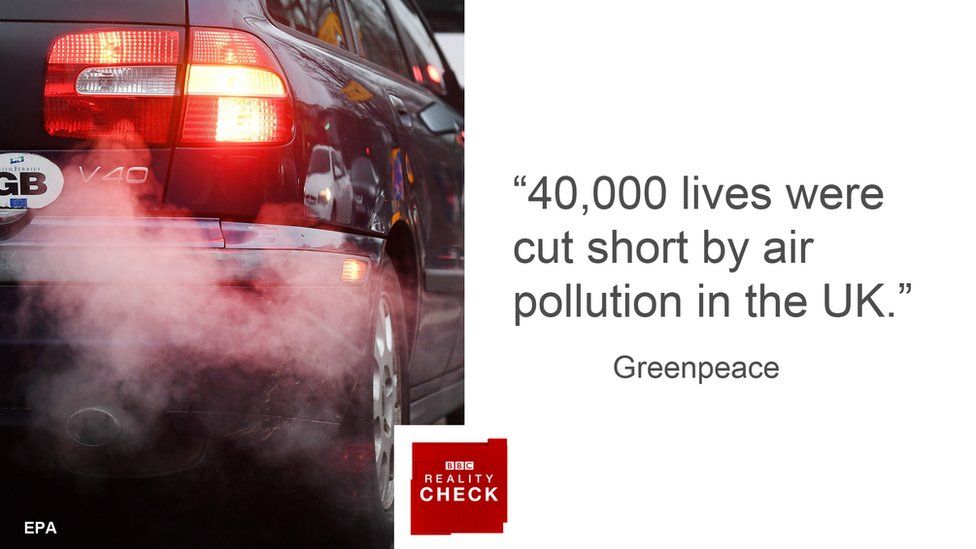Reality Check: Does pollution cut short 40,000 lives a year?
- Published

The claim: Air pollution cuts short 40,000 lives a year in the UK.
Reality Check verdict: The 40,000 figure for the UK stems from extensive research over decades in the US. It's a statistical construct not a count of actual deaths. There is no question that air pollution, caused by many factors, is a serious health problem but it's difficult to assess its precise impact.
It is not possible to count the number of people who have died early as a result of pollution because nobody has air pollution written as the cause of death on their death certificates.
This means that comparisons between numbers of people killed by air pollution and, for example, tuberculosis or malaria are generally bogus.
Air pollution tends to make existing conditions worse, especially cardiovascular disease and lung conditions.
The 40,000 early deaths figure is a statistical construct, which originated in a report from the Royal College of Physicians last year.
That report combined figures for deaths contributed to by PM2.5 (which is particulates in the air that are smaller than 2.5 micrometres) and those from nitrogen dioxide.
The figure it used for PM2.5 was 29,000, which was calculated in 2009 by the Committee on the Medical Effects of Air Pollution (COMEAP), which provides independent advice to government on the effects of pollution.
The nitrogen dioxide (NO2) figure was 23,500 attributable deaths - it came from a 2015 report from the Department of Environment, Food and Rural Affairs (Defra).
Clearly those numbers do not add up to 40,000, but there is some overlap between them, so the combined estimate of 40,000 was taken.
So I Can Breathe
A week of coverage by BBC News examining possible solutions to the problems caused by air pollution.
The COMEAP report that came up with the 29,000 figure takes as its starting point the findings of this report that looked at what happened in various parts of the US between 1980 and 2000 and concluded that for every extra 10 micrograms per cubic metre of PM2.5 in the air, there is about a 6% increase in the mortality risk per year.
The COMEAP report goes about using this in a different way, but Prof David Spiegelhalter from Cambridge University, works it out with a simpler, back-of-an-envelope calculation, which is that the average level of PM2.5 in the UK is about 9 micrograms per cubic metre, which means that risk should be rising by about 5%.
There are 600,000 deaths a year in the UK, and 5% of that is 30,000, which is close to the COMEAP figure of 29,000.
But the authors of this report stressed the uncertainty of their findings. In particular, COMEAP said when it used the 6% figure that it was 75% confident the actual figure was between 1% and 12%. That translates as meaning that that the number of early deaths, for which 29,000 was the central estimate, was probably between 5,000 and 60,000, but there was a one in four chance that it was even outside that range.
Also, the 29,000 early deaths figure was based on an average shortening of life of 11.5 years. If you're considering how many people actually had their lives shortened at all in a particular year (the report was looking at 2008) then the number of people affected would be much higher.
The authors of the report actually prefer to say that air pollution causes 340,000 years of lost life in the UK, but they are concerned that people will not understand that as well, so they translate that figure into damage equivalent to 29,000 deaths, an average of 11.5 years early instead.
The NO2 figure is reached in much the same way, except that its central estimate is of a 2.5% increase in mortality for an extra 10 micrograms per metre cubed.
The key difficulty is that there is no way of checking whether this is the case and whether 40,000 people died earlier than they would otherwise have done as a result of air pollution in the UK. So instead we have to rely on statistical estimates to help us understand the severity of the problem.
- Published23 February 2016